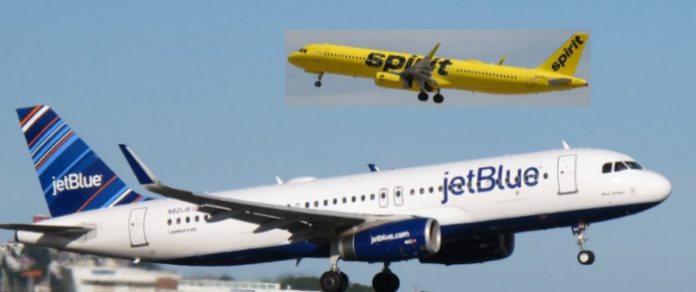
-
JetBlue Airways, Spirit Airlines agree on a US$3.8-billion merger on July 28
-
Long Island-based JetBlue wins Spirit’s approval by trumping a rival offer by Frontier Airlines that was about $1 billion lower
-
The merger will still have to gain approval from Spirit shareholders and US regulators
JetBlue Airways struck a deal on July 28 to take over Spirit Airlines in a merger of two budget carriers that would create the fifth-largest airline in the United States.
The agreement, which values ultra-low-cost Spirit at US$3.8 billion, was bagged by JetBlue, which trumped a rival offer by Frontier Airlines on July 27 that fell short of JetBlue’s offer by about US$1 billion.
The successful takeover by Long Island, New York-headquartered JetBlue, would create the US’ fifth-largest airline with a more than 10% market share, behind United Airlines, which has about 14%, Delta Air Lines and Southwest Airlines, which hold more than 17% each, and American Airlines, which controls more than 18%.
JetBlue Airways is the seventh largest airline in North America by the number of passengers carried. Spirit Airlines, with headquarters in Miramar, Florida, operates scheduled flights to more than 60 destinations throughout the US, in the Caribbean and Latin America.
The Biden administration’s antitrust regulators are likely scrutinize the deal thoroughly amid an the administration’s aggressive stand against corporate consolidation in a sector with a few players.
“Our argument is clear: The best thing we can do in the US to create a more competitive industry is to allow JetBlue to grow,” Robin Hayes, the airline’s chief executive, was quoted by The New York Times as saying.
The next step in the merger saga will be for JetBlue and Spirit to seek approval of their union from Spirit shareholders this autumn and from regulators by early 2024, the newspaper reported.
When they get over those two hurdles, airlines plan to close the transaction by the first half of 2024 and begin flying as a single carrier by the first half of 2025.
The merger, however, faces other challenges. Regulators have already sued JetBlue and American over a partnership at airports in Boston and New York, the report said.
On January 27, the Federal Trade Commission filed a lawsuit to block the social media giant Meta’s acquisition of a small virtual reality company, Within, as regulators flexed their muscles against corporate deals suspected as anti-trust violations.
The New York Times said that to address regulatory scrutiny, JetBlue has said it will pre-emptively divest from certain airports where it and Spirit together have a big presence.
A major concern in airline mergers is that they can make one company dominant at certain airports or on particular routes, enabling it to squelch competition and raise fares for some travellers.
If regulators prevent the acquisition, JetBlue will pay Spirit US$70 million and Spirit’s shareholders US$400 million, the report said.
Under the agreement, JetBlue would acquire Spirit for at least US$33.50 per share in cash, significantly more than Spirit’s current price.
Spirit’s stock ended Thursday up less than 6% at US$25.66 per share, reflecting skepticism about the deal. Frontier’s stock, meanwhile, shot up more than 20% on Thursday.




